Chinese political system中国政治体制
中国政治制度史
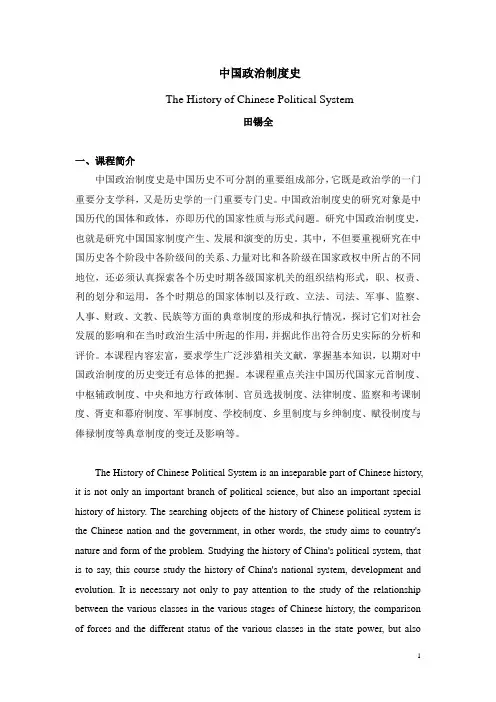
中国政治制度史The History of Chinese Political System田锡全一、课程简介中国政治制度史是中国历史不可分割的重要组成部分,它既是政治学的一门重要分支学科,又是历史学的一门重要专门史。
中国政治制度史的研究对象是中国历代的国体和政体,亦即历代的国家性质与形式问题。
研究中国政治制度史,也就是研究中国国家制度产生、发展和演变的历史。
其中,不但要重视研究在中国历史各个阶段中各阶级间的关系、力量对比和各阶级在国家政权中所占的不同地位,还必须认真探索各个历史时期各级国家机关的组织结构形式,职、权责、利的划分和运用,各个时期总的国家体制以及行政、立法、司法、军事、监察、人事、财政、文教、民族等方面的典章制度的形成和执行情况,探讨它们对社会发展的影响和在当时政治生活中所起的作用,并据此作出符合历史实际的分析和评价。
本课程内容宏富,要求学生广泛涉猎相关文献,掌握基本知识,以期对中国政治制度的历史变迁有总体的把握。
本课程重点关注中国历代国家元首制度、中枢辅政制度、中央和地方行政体制、官员选拔制度、法律制度、监察和考课制度、胥吏和幕府制度、军事制度、学校制度、乡里制度与乡绅制度、赋役制度与俸禄制度等典章制度的变迁及影响等。
The History of Chinese Political System is an inseparable part of Chinese history, it is not only an important branch of political science, but also an important special history of history. The searching objects of the history of Chinese political system is the Chinese nation and the government, in other words, the study aims to country's nature and form of the problem. Studying the history of China's political system, that is to say, this course study the history of China's national system, development and evolution. It is necessary not only to pay attention to the study of the relationship between the various classes in the various stages of Chinese history, the comparison of forces and the different status of the various classes in the state power, but alsoseriously explore the various historical periods at all levels of state organs of the organizational structure, the formation and implementation of the rules and regulations of the various national systems and administrative, legislative, judicial, military, supervisory, personnel, finance, culture and education, ethnic groups and other aspects of the formation and implementation of the system. This course systematically explores their social development and the role played in the political life at that time, and makes in line with the historical analysis and evaluation. The content of this course is abundant, so, it guides students to extensively cover the relevant literature, master the basic knowledge with a view to the historical changes in China's political system have overall grasp.This course focuses on the system of leader-selection of China, the central government system, the central and local administrative system, the officials’ selection system, the legal system, the supervi sion and examination system, the military system, the school system, Gentry system, tax system and the salary system and so on. It requires students to read relevant literature extensively, master the basic knowledge and grasp the historical changes in China's political system.二、教学目标在方法上,每讲都梳理各个历史阶段的制度变迁总体态势及其时代特色,中间穿插权威观点、补充背景内容,课后提供讨论和探究活动的建议和进一步阅读的文献。
当代中国政治制度 -第十一章
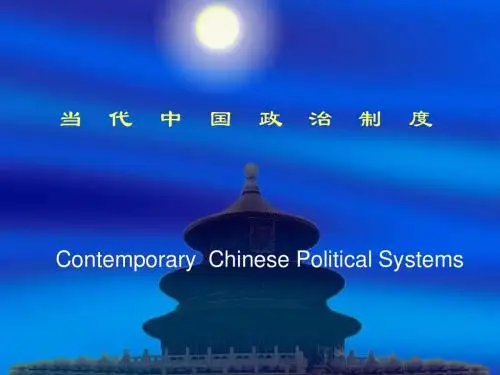
中
国
政
治 制
度
Contemporary Chinese Political Systems
第十一章当代中国特别行政区制度
通过本章的学习,理解建立特别行政区制度
的意义,认识香港特别行政区的政治体制, 了解特别行政区行政长官、行政机关、立法 机关、司法制度和公务员制度的职权与特点 。
第一节 特别行政区制度概述
(1)“三司”(即政务司、财政司、
律政司)是香港特别行政区政府的第一 级政府机构。 (2)“局”是香港特别行政区政府的 第二级政府机构。 (3)香港特别行政区除了设置“司” 、“局”之外,还设置“署”、“处” 等政府机构。
《澳门基本法》规定:澳门特别行政区政府
设司、局、厅、处,并设立廉政公署和审计 署独立工作。廉政专员和审计长对行政长官 负责。
二、特别行政区的法律地位
1.特别行政区是享有高度自治权的地方行政
区域
(1)特别行政区是单一制国家结构形式下的地方
行政区域。 (2)特别行政区是一个享有高度自治权,基本保 留原有法律,实行资本主义制度和生活方式的特别 行政区。 (3)特别行政区是直辖于中央人民政府的地方行 政区域,它享有高度自治权,不同于中华人民共和 国的一般地方行政区和民族自治区。
(2)坚持“两种制度”,即在统一的中华人
民共和国内,作为国家主体的大陆地区实行 社会主义制度,台湾、香港、澳门作为统一 国家不可分割的组成部分保持原有的资本主 义制度不变。 (3)高度自治。
[多选]特别行政区是地方的政权,除在外
交、国防等方面服从中央政府外,享有高度 的自治权,包括行政管理权、立法权、独立 司法权和终审权。
3、对行政长官提出弹劾案的职权。 香港特别行政区立法会全体议员的四分之一联合动
A0130003当代中国政治制度
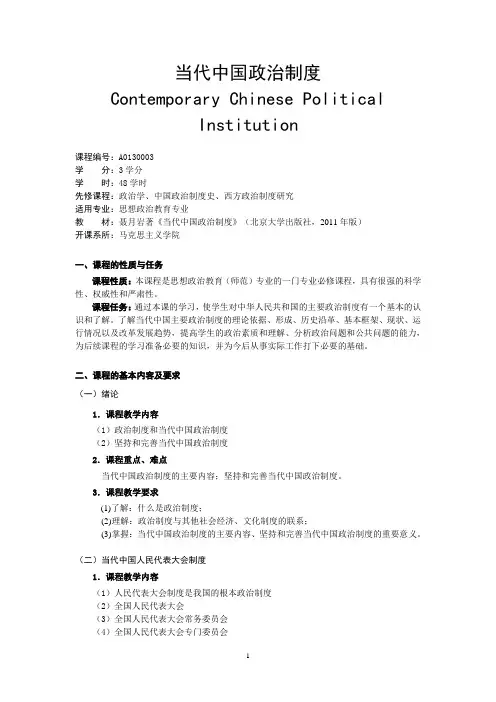
当代中国政治制度Contemporary Chinese PoliticalInstitution课程编号:A0130003学分:3学分学时:48学时先修课程:政治学、中国政治制度史、西方政治制度研究适用专业:思想政治教育专业教材:聂月岩著《当代中国政治制度》(北京大学出版社,2011年版)开课系所:马克思主义学院一、课程的性质与任务课程性质:本课程是思想政治教育(师范)专业的一门专业必修课程,具有很强的科学性、权威性和严肃性。
课程任务:通过本课的学习,使学生对中华人民共和国的主要政治制度有一个基本的认识和了解。
了解当代中国主要政治制度的理论依据、形成、历史沿革、基本框架、现状、运行情况以及改革发展趋势,提高学生的政治素质和理解、分析政治问题和公共问题的能力,为后续课程的学习准备必要的知识,并为今后从事实际工作打下必要的基础。
二、课程的基本内容及要求(一)绪论1.课程教学内容(1)政治制度和当代中国政治制度(2)坚持和完善当代中国政治制度2.课程重点、难点当代中国政治制度的主要内容;坚持和完善当代中国政治制度。
3.课程教学要求(1)了解:什么是政治制度;(2)理解:政治制度与其他社会经济、文化制度的联系;(3)掌握:当代中国政治制度的主要内容、坚持和完善当代中国政治制度的重要意义。
(二)当代中国人民代表大会制度1.课程教学内容(1)人民代表大会制度是我国的根本政治制度(2)全国人民代表大会(3)全国人民代表大会常务委员会(4)全国人民代表大会专门委员会(5)地方各级人民代表大会(6)县级以上地方各级人大常委会(7)乡级人民代表大会2.课程重点、难点人民代表大会制度的发展、性质与原则;全国人民代表大会;人民代表大会制度的改革与完善。
3.课程教学要求1、了解:人民代表大会制度是我国的根本政治制度、全国人民代表大会是我国的最高国家权力机关、地方各级人民代表大会是地方国家权力机关;2、理解:人民代表大会制度的发展、性质与原则、全国人民代表大会、全国人大常委会和各专门委员会、地方各级人民代表大会、人民代表大会制度的改革与完善;3、掌握:我国的政权组织形式、国家权力机关的设置。
中国政体-REVISED
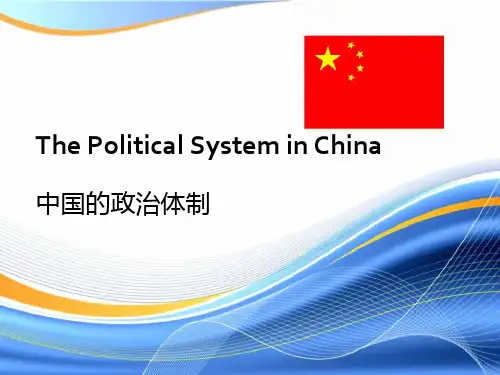
system of people's congress是人 大么,注意跟后 面的NPC保持一 致
The most powerful organ of state
• Accroding to Chinese Constitution, National People's Congress (NPC) is the most powerful organ of China. • NPC's permanent body is the Standing Committee of the NPC.
The compotision of NPC
• In accordance with the legal procedures, the menbers of NPC are all selected by democratic elections. • The deputies of NPC are elected by deputies in local people's congresses. And every deputy serves a term of five years.
The State Council
• The State Council is composed of premier, vice-premiers, state councilors, ministers, ministers in charge of commissions, auditor-general and secretary-general. • The premier has overall responsibility for the State Council.
中国政治制度史
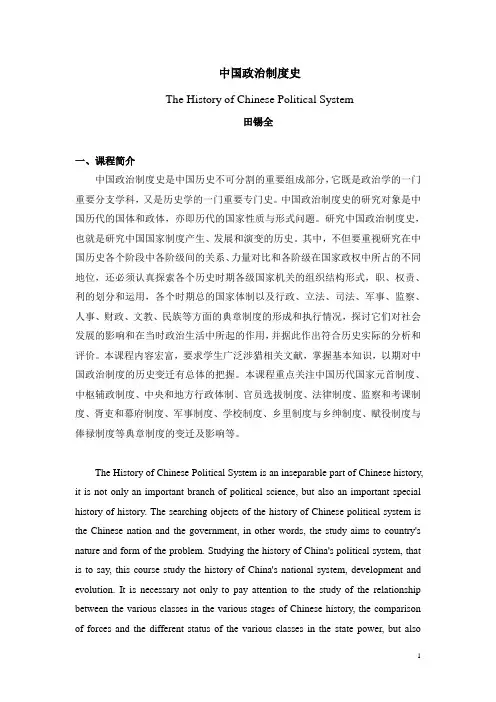
中国政治制度史The History of Chinese Political System田锡全一、课程简介中国政治制度史是中国历史不可分割的重要组成部分,它既是政治学的一门重要分支学科,又是历史学的一门重要专门史。
中国政治制度史的研究对象是中国历代的国体和政体,亦即历代的国家性质与形式问题。
研究中国政治制度史,也就是研究中国国家制度产生、发展和演变的历史。
其中,不但要重视研究在中国历史各个阶段中各阶级间的关系、力量对比和各阶级在国家政权中所占的不同地位,还必须认真探索各个历史时期各级国家机关的组织结构形式,职、权责、利的划分和运用,各个时期总的国家体制以及行政、立法、司法、军事、监察、人事、财政、文教、民族等方面的典章制度的形成和执行情况,探讨它们对社会发展的影响和在当时政治生活中所起的作用,并据此作出符合历史实际的分析和评价。
本课程内容宏富,要求学生广泛涉猎相关文献,掌握基本知识,以期对中国政治制度的历史变迁有总体的把握。
本课程重点关注中国历代国家元首制度、中枢辅政制度、中央和地方行政体制、官员选拔制度、法律制度、监察和考课制度、胥吏和幕府制度、军事制度、学校制度、乡里制度与乡绅制度、赋役制度与俸禄制度等典章制度的变迁及影响等。
The History of Chinese Political System is an inseparable part of Chinese history, it is not only an important branch of political science, but also an important special history of history. The searching objects of the history of Chinese political system is the Chinese nation and the government, in other words, the study aims to country's nature and form of the problem. Studying the history of China's political system, that is to say, this course study the history of China's national system, development and evolution. It is necessary not only to pay attention to the study of the relationship between the various classes in the various stages of Chinese history, the comparison of forces and the different status of the various classes in the state power, but alsoseriously explore the various historical periods at all levels of state organs of the organizational structure, the formation and implementation of the rules and regulations of the various national systems and administrative, legislative, judicial, military, supervisory, personnel, finance, culture and education, ethnic groups and other aspects of the formation and implementation of the system. This course systematically explores their social development and the role played in the political life at that time, and makes in line with the historical analysis and evaluation. The content of this course is abundant, so, it guides students to extensively cover the relevant literature, master the basic knowledge with a view to the historical changes in China's political system have overall grasp.This course focuses on the system of leader-selection of China, the central government system, the central and local administrative system, the officials’ selection system, the legal system, the supervi sion and examination system, the military system, the school system, Gentry system, tax system and the salary system and so on. It requires students to read relevant literature extensively, master the basic knowledge and grasp the historical changes in China's political system.二、教学目标在方法上,每讲都梳理各个历史阶段的制度变迁总体态势及其时代特色,中间穿插权威观点、补充背景内容,课后提供讨论和探究活动的建议和进一步阅读的文献。
中国政治类英语作文模板
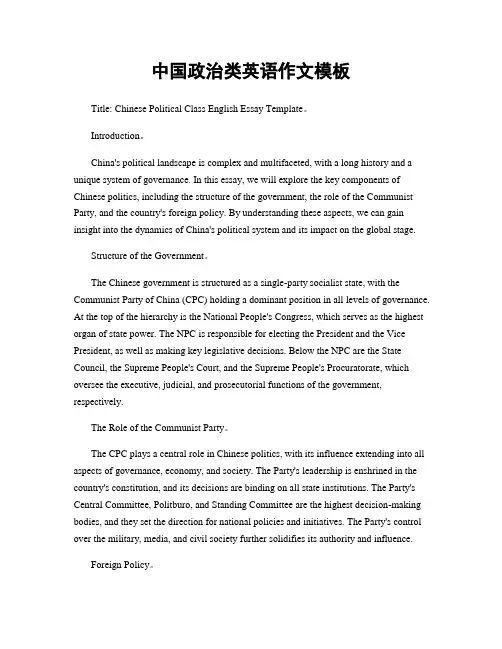
中国政治类英语作文模板Title: Chinese Political Class English Essay Template。
Introduction。
China's political landscape is complex and multifaceted, with a long history and a unique system of governance. In this essay, we will explore the key components of Chinese politics, including the structure of the government, the role of the Communist Party, and the country's foreign policy. By understanding these aspects, we can gain insight into the dynamics of China's political system and its impact on the global stage.Structure of the Government。
The Chinese government is structured as a single-party socialist state, with the Communist Party of China (CPC) holding a dominant position in all levels of governance. At the top of the hierarchy is the National People's Congress, which serves as the highest organ of state power. The NPC is responsible for electing the President and the Vice President, as well as making key legislative decisions. Below the NPC are the State Council, the Supreme People's Court, and the Supreme People's Procuratorate, which oversee the executive, judicial, and prosecutorial functions of the government, respectively.The Role of the Communist Party。
当代中国政治制度导论
当代中国政治制度导论一、政治制度及相关概念1、社会制度socialinstitution。
包括社会经济制度和社会上层建筑方面的制度2、政治制度politicalinstitution。
政治制度是指社会政治领域中要求各类政治实体加以遵循的相对稳定的行为准则。
3、国体。
国家政权的阶级属性。
有奴隶主阶级专-政、封建阶级专-政、资产阶级专-政、无产阶级专-政。
4、人民民-主专-政制度。
是指工人阶级领导的、以工农联盟为基础,在人民内部实行民-主、对敌人实行专-政的一种制度。
是我国的国体。
实质上是无产阶级专-政,是具有中国特色的无产阶级专-政。
5、政体。
政权的组织形式,指统治阶级采取何种方式组织自己的政权机关,占统治地位的阶级按本阶级需要根据一定的原则设立国家政权机构,规定这些机构之间的权力关系,并确定这些机构的基本组织原则和方法。
6、基本政治制度和具体政治制度。
7、政治体制改革二、政治制度的相关原理1、主权国家理论TheSovereignState马克思主义国家观State:includesasetofpoliticalinstitutions-legislatu res,executives,bureaucracies,andarmies–aswellasthosewhorule-leadersandpowerfulgroups-which makeauthoritativeandbindingdecisionsoverthepeoplein aspecificgeographicarea.Nation:ethnicgroupcountry:geographicareaRegime:thesetofleadersandinstitutionsholdingpowerin astate.Sovereign:非政府组织NGo:non-governmentalorganizationEUwToImF2、合法性理论Legitimacywherepeoplefreelyacceptthosewhowieldpoweroverthem,p owerislegitimate.maxweber:Tradition,charisma,andRationality/LegalityLegitimacyisakeyfactorinunderstandingthesurvivalofr egimes.权力与权威PowerandAuthorityPowerreferstotheabilitytogetsomeonetodosomethingtha ttheywouldnototherwisedo.AuthorityIusuallyemployedtodenotepowerthatisvieweda sproperandisvoluntarilyacceptedbythosewhoaregoverned.3、民-主理论DemocracySelf-governmentascitizensdirectlyorindirectlygovern themselvesThreeelements:freeelections,respectforhumanrights,a ndlimitedgovernment自由选举Freeelection Electionmustbeheldonaregularbasisforthekeypolicy-ma-ki-ngpositioninnationalpoliticsElectionmustinvolvealternativecandidatesrepresentin gdifferentpoliticalviewpointsVotingshouldbeuniversalforalladults,andballotingsho uldbethroughsecretballotwiththeelectorateabletomake theirchoiceswithoutfearofsanctions.Electionresultsmustbehonestlytabulatedandthoseelect edbroughtintotheappropriateoffices人权与公民自由HumanrightsandcivillibertiesFreespeech;righttoassemble;freedomofthepress;freedo mofreligion;freedomfromdiscriminationonthegroundsof race,se-x,religion,orsocialclass;righttoaspeedyandf airtrialwhenaccusedofcrimes;righttovoteRighttojob,retirement,security,andmedicalcareTheserightsevolveovertimeandchangefromoneculturetoa nother.有限政府LimitedgovernmentSharingthedecisionma-ki-ngSharingtheriskofabsolutism三、当代中国政治制度的研究对象及主要内容当代中国政治制度,是指1949年10月以来的中华人民共和国的政治制度。
二十世纪的中国政治制度史研究
二十世纪的中国政治制度史研究一、本文概述Overview of this article《二十世纪的中国政治制度史研究》一文旨在深入探讨二十世纪中国政治制度的发展历程和变革。
本文首先将对二十世纪中国政治制度的主要特点、演变过程及其影响因素进行全面的概述,从而为读者提供一个清晰的历史脉络和理论基础。
The article "Research on the History of Chinese Political System in the 20th Century" aims to delve into the development and transformation of China's political system in the 20th century. This article will first provide a comprehensive overview of the main characteristics, evolution process, and influencing factors of the political system in 20th century China, in order to provide readers with a clear historical context and theoretical foundation.本文将从多个角度对二十世纪中国政治制度的演变进行分析,包括政治体制、行政管理、立法与司法、政党制度等方面。
通过对这些方面的深入研究,本文将揭示二十世纪中国政治制度在应对国内外环境变化、推动社会进步和满足人民需求方面的积极作用和局限性。
This article will analyze the evolution of China's political system in the 20th century from multiple perspectives, including political system, administrative management, legislation and justice, and party system. Through in-depth research on these aspects, this article will reveal the positive role and limitations of China's political system in responding to domestic and international environmental changes, promoting social progress, and meeting the needs of the people in the 20th century.在概述部分,本文将重点关注二十世纪中国政治制度的主要变革和转折点,如辛亥革命、五四运动、新中国成立等事件对中国政治制度产生的深远影响。
中美政治比较中英中英文对照
中美政治比较中英中英文对照Document number【980KGB-6898YT-769T8CB-246UT-18GG08】中美政治制度差异研究The political system of China and the United States differences research中国和美国政治制度现状China and the status quo of the American political system(一)中国的政治制度(a) of China's political system我国的政治制度概括起来主要有人民代表大会制度、中国人民政治协商制度、民族区域自治制度等。
In summary of political system in China mainly include the people's congress system, the Chinese people's political consultative system, regional national autonomy system, etc.中国宪法规定:“中华人民共和国实行的是人民代表大会制度,中华人民共和国的一切权力属于人民;人民行使国家权力的机关是全国人民代表大会和地方各级人民代表大会。
”全国人民代表大会是中国的最高国家权力机关,统一行使国家最高权力,人民代表大会制度是中国的根本政治制度,是实现人民民主专政的政治形式,是中国的政体。
全国人民代表大会和地方各级人民代表大会都由民主选举产生,对人民负责,受人民监督。
我国的选举制度是人民代表大会制度的重要组成部分,目前我国的选举制度的原则和主要内容一方面在宪法中得到确定,另一方面,全国人大组织法、地方各级人大组织法和选举法等有关法律法规也根据宪法所确立的社会主义选举制度的基本原则,对我国选举的具体内容作了详细的规定,它们同宪法一同构成了我国社会主义选举制度的法律基础。
中国政治英语词汇
中国政治英语词汇(第一课)讀中文做口譯中国政体与国策I. 中国共产党中央委员会Central Committee of the Communist Party of China中国共产党中央委员会总书记General secretary of the Central Party Committee 中央政治局常务委员会Standing Committee of the Political Bureau of the CP中央书记处Secretariat of the Central Party Committee中央军事委员会Central Military Commission of the CPC (总后勤部 the General Logistics Department) (第二炮兵司令部the Headquarters of the 2nd Artillery Corps) (中国人民警察the Chinese People’s Armed Police Force) (国民自卫队 the Militia)中央纪律检查委员会Central Commission for Discipline Inspection of the CPC中央宣传部Publicity Department, CCCPC中央统一战线部United Front Work Department, CCCPC中央对外联络部International Liaison Department, CCCPC中央政法委员会Committee of Political and Legislative Affairs, CCCPC中央党校Party School of the CPC中央档案馆Archives Bureau, CCCPCII. 中国人民政治协商会议the Chinese People’s Political Consultative Conference 中国人民政治协商会议全国委员会the National Committee of the CPPCC中国人民政治协商委员会地方委员会CPPCC Local CommitteesIII. 中华人民共和国中央政府 the Central People’s Government of the PRC中华人民共和国主席 President of PRC中央政府和地方各级政府the Central government and local governments at different levels直辖市 Municipality 省会 Provincialand Commerce质检总局 General Administration of Quality Supervision, Inspection and Quarantine环保总局State Environmental Protection Administration民航总局General Administration of Civil Aviation广电总局State Administration of Radio, Film and Television安全监管总局 State Administration of Work Safety食品药品监管局State Food and Drug Administration国管局 Government Offices Administration of the State Council烟草局State Tobacco Monopoly Administration外专局State Administration of Foreign Experts Affair保密局National Administration for the Protection of State Secrets统计局 National Bureau of Statistics林业局 State Forestry Administration旅游局 National Tourism Administration知识产权局State Intellectual PropertyOffice地震局 China Earthquake Administration气象局 China Meteorological Administration信访局 State Bureau for Letters and Calls粮食局 State Administration of Grain海洋局 State Oceanic Administration测绘局 State Bureau of Surveying & Mapping档案局 State Archives Administration外汇局State Administration of Foreign Exchange新闻出版总署(版权局) General administration of Press and Publication(National Copyright Administration)4. 侨办 Overseas Chinese Affairs Office 国研室 Research Office港澳办 Hong Kong and Macao Affairs Office新闻办 Information Office法制办Legislative Affairs Office 台办 Taiwan Affairs Office社保基金会National Council for Social Security Fund自然科学基金会 National Natural Science Foundation(3) a. 最高人民法院 the Supreme People’sCourt(SPC)最高人民法院院长 the President of the SPC审判长 the presiding judge审判委员会 the Trial Committee 审判机关 the Trial Organ第一刑事法庭 the First Criminal Court 民事法庭 the Civil Courtb. 最高人民检察院 the Supreme People’s Procuratorate最高人民检察院检察长the Procurator-general of the SPP最高人民检察院副检察长the Deputy Procurator-general(4)香港特别行政区政府 Government of theHong Kong Special Administrative Region澳门特别行政区政府 Government of the Macao Special Administrative Region(5). 民主党派 Democratic Party中国国民党革命委员会(民革)Revolutionary Committee of the Kuomintang中国民主同盟(民盟)China Democratic League 中国民主建国会(民建)China Democratic National Construction Association中国民主促进会(民进)China Association Promoting Democracy中国农工民主党Chinese Peasants' and Workers' Democratic Party中国致公党China Zhi Gong Dang 九三学社Jiu San Society台湾民主自治同盟(台盟)Taiwan Democratic self-government二.口译政治用语和国策宪法 Constitution 国旗 National flag: Red flag with five stars国徽 National emblem: Tiananmen Gate-tower under five stars, encircled by ears of grain and with a gear wheel below国歌National anthem: March of the Volunteers 党章 Party Constitution1. 党的三代中央领导集体创建了毛泽东思想、邓小平理论、江泽民“三个代表”重要思想,从而在民族独立和人民解放的基础上为中华民族的伟大复兴开启了建设有中国特色的社会主义的伟大事业。
- 1、下载文档前请自行甄别文档内容的完整性,平台不提供额外的编辑、内容补充、找答案等附加服务。
- 2、"仅部分预览"的文档,不可在线预览部分如存在完整性等问题,可反馈申请退款(可完整预览的文档不适用该条件!)。
- 3、如文档侵犯您的权益,请联系客服反馈,我们会尽快为您处理(人工客服工作时间:9:00-18:30)。
State Council
国务院隶属部门
Departments of the State Council
Ministry of Foreign Affairs 外交部 Ministry of National Defense 国防部 National Development and Reform Commission 国家发展和改革委员会 Ministry of Education 教育部 Ministry of Science and Technology 科学技术部 State Ethnic Affairs Commission 国家民族事务委员会 Ministry of Environment Protection 环保部 Ministry of Industry and InformationConstruction Technology 住房与城乡建设部 工业和信息化部 Ministry of Housing and Urban-Rural Ministry of Public Security 交通运输部 公安部 Ministry of Transportation Ministry of StateResources Security 国家安全部 Ministry of Water 水利部 Ministry of Supervision 监察部 Ministry of Culture 文化部 Ministry of Civil Affairs 农业部 民政部 Ministry of Agriculture Ministry of Justice 司法部 Ministry of Commerce 商务部 Ministry of Finance 财政部 Health and Family Planning Commission 国家卫生和计划生育委员会 Ministry Bank of Land and Resources 国土资源部 People's of China 中国人民银行 Ministry of Human Resources Audit Commission 审计署 and Social Security 人社部
中国梦 China Dream
பைடு நூலகம்
President of the People's Republic of China Standing Committee Central Military Commission Supreme People's Court Supreme People's Procuratorate
中央军事委员会 最高人民法院 最高人民检察院 国务院
中华人民共和国是工人阶级领导的,以工 农联盟为基础的人民民主专政的社会主义国家。 社会主义制度是中华人民共和国根本制度。
中国国家机关
China's State Organs
The System of Nation
全国人民代表大会 国家主席 常务委员会
National People's Congress (NPC)
中国共产党
the Communist Party of China(CPC)
The Communist Party of China is the vanguard of the Chinese working class and the faithful representative of the interests of the Chinese people of all ethnic groups. It is the core of the leadership over the socialist republic of China . It works towards the highest form of advanced productivity ,advanced culture ,and the basic interests of the Chinese people.
the theoretical system of socialism
中国社会主义思想
毛泽东思想 Mao Zedong Thought
邓小平理论 Deng Xiaoping Theory
“三个代表” Three Represents
科学发展观 the Scientific Development Concept
China Democratic League 中国民盟 Jiu San(September 3) Society 九三学社 China Public Interest Party 中国致公党 Revolutionary Committee of the Chinese Kuomintang 中国国民党革命委员会 China Association for promoting Democracy 中国民主促进会 Chinese Peasants and Workers Democratic Party 中国农工民主党 … …
Political Systems
Political Systems in China
China's State Organs The Communist Party of China(CPC) The theoretical system of socialism社会主义的 理论体系
The People’s Republic of China is a socialist country led by the working class , based on the worker-peasant alliance and practicing people’s democratic centralism . The socialist system is the primary system in China.
People‘s Political Consultative Conference 政治协商会议
Multi-Party Cooperation 多党合作 “long-term coexistence ,mutual supervision , sincere treatment with each other and sharing of weal or woe” “长期共存,互相监督,肝胆相照,荣辱与共” Democratic Parties
中国共产党是中国工人阶级的先锋队,同时 也是中国人民和中华民族的先锋队,是中国特色 社会主义事业的领导核心,代表中国先进生产力 的发展要求,代表中国先进文化的前进方向,代 表中国最广大人民的根本利益。
The System of CPC
The CPC’s National Congress 中国共产党全国人民代表大会 The Central Committee 中央委员会 (CCCPC) The Central Commission for Discipline Inspection 中央纪律检查委员 CCCPC general secretary中央委员会总书记 The Central Political Bureau 中央政治局 The Political Bureau’s Standing Committee 中央政治局常委员会 The Central Secretariat 中央书记处 The Central Military Commission 中央军事委员会
